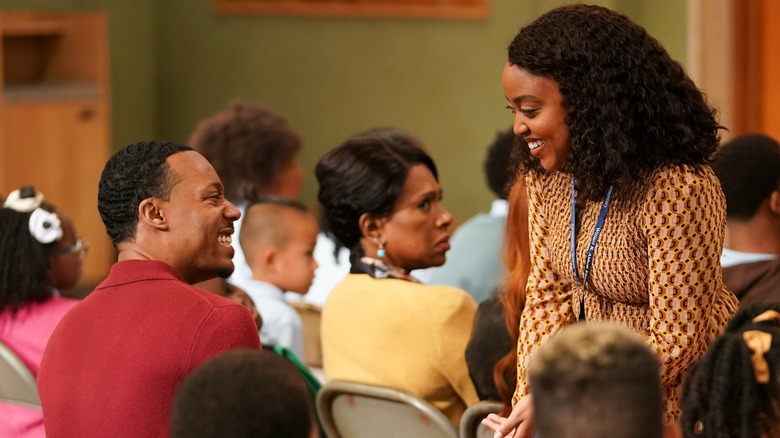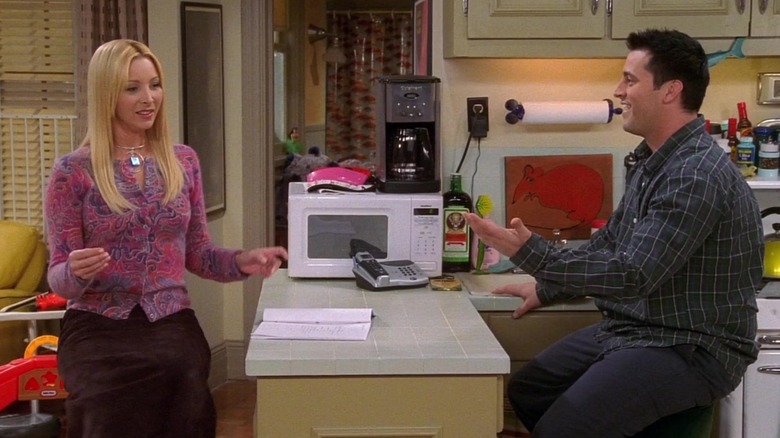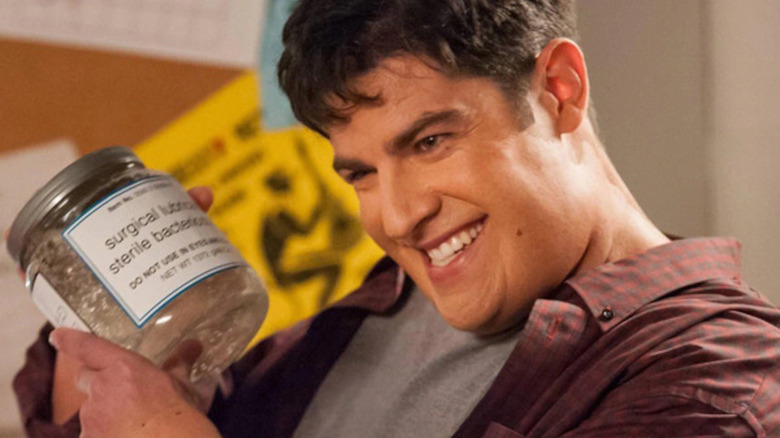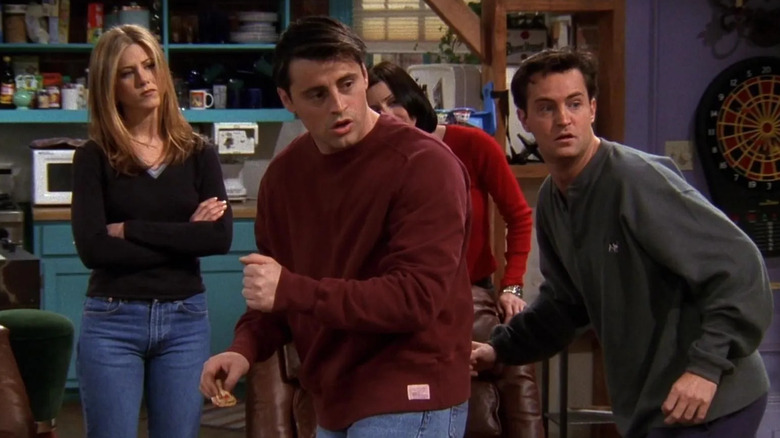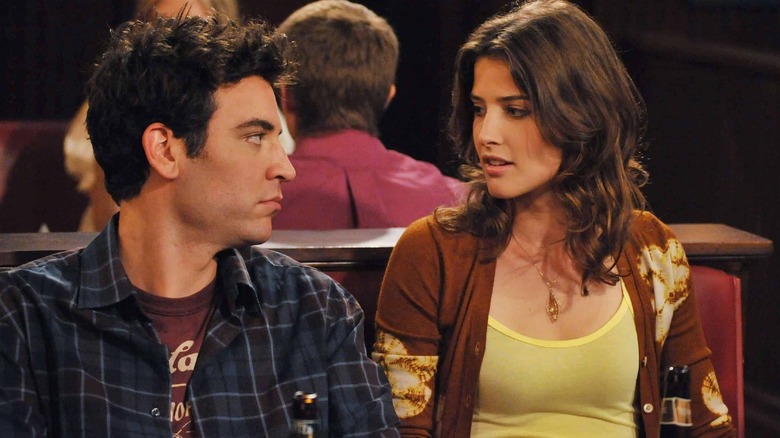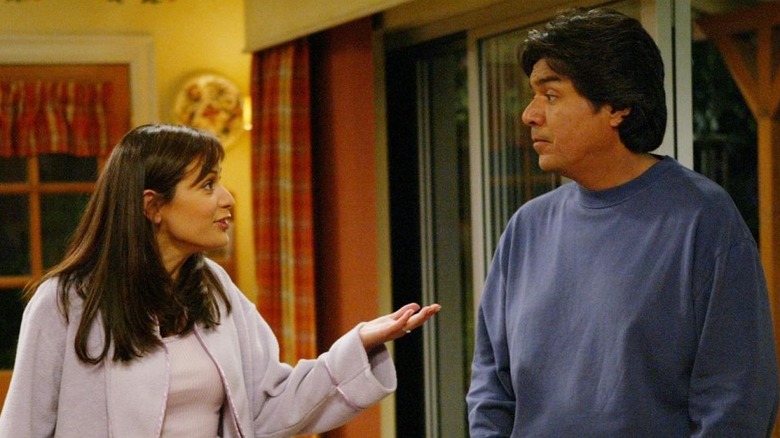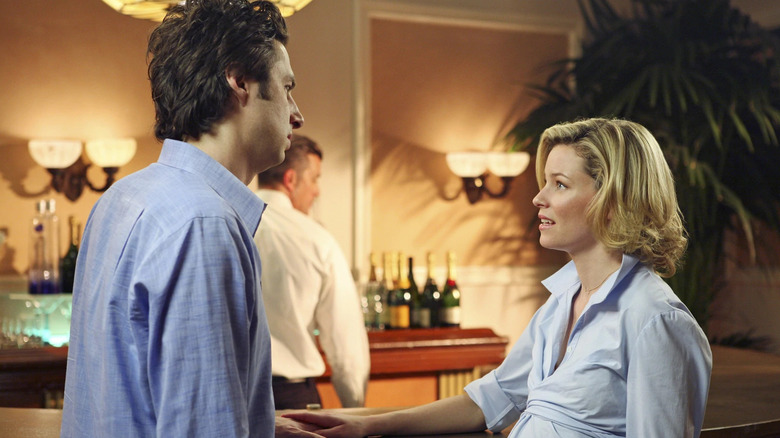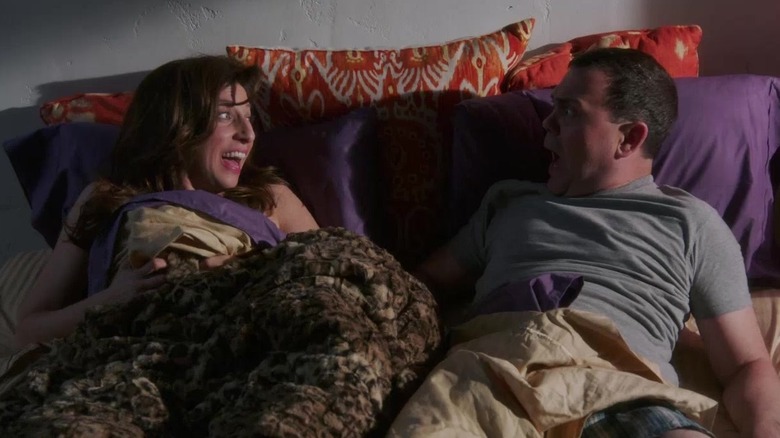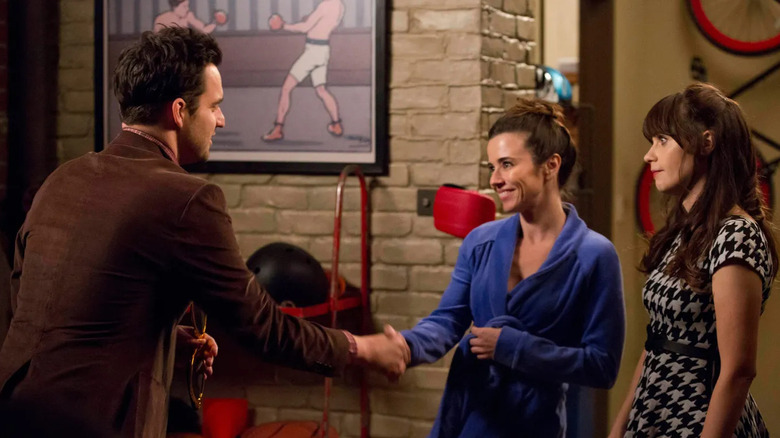10 Sitcom Tropes That Ought To Be Retired
Any serious fan of TV or movies knows a thing about tropes — the setups, gags, and story beats that get reused by writers and showrunners to tell familiar narratives. The sitcom, or almost any form of standard television comedy if you subscribe to a less-strict interpretation of what constitutes a sitcom, usually can't be very successful without a healthy dose of familiar tropes. Part of why people love sitcoms is that they don't require a lot of energy from their audience in order to be enjoyed. For the most part, viewers should know the kind of decisions that characters would make and that each episode will have its own self-contained arcs that can be enjoyed and resolved over the course of thirty minutes or an hour.
That being said, there are some tropes that are just too tired, dated, and poorly executed. Almost any trope can be turned on its head or written well enough that it feels fresh — something that is evidenced by the underrated brilliance of a show like "Community." Of course, most sitcoms don't seem to want to subvert tropes, they want to take the easy way out with a New York City setting or a nagging mother. However, some tropes are just straight-up harmful, and it's pretty ridiculous that fat-phobic humor and reliance on the gender binary are still so prevalent in TV comedy in 2023.
Here are ten sitcom setups that we'd like to see retired forever.
New York City
Yes, New York is one of the greatest cities on Earth and probably the most iconic city in America. We understand the appeal of setting any show, especially a sitcom, in one of the most widely recognizable places in the world, but at this point, it actually feels like everything that can be explored in a sitcom about NYC has been explored. "Seinfeld," "How I Met Your Mother," "Friends," "Brooklyn Nine-Nine," "Girls," "Master of None," and "30 Rock" are just a fraction of all of the shows to be found with groups of wacky friends or coworkers roaming the streets and subways of Manhattan (and sometimes Brooklyn).
Don't get us wrong, most of those sitcoms are great, and NYC is a big part of what makes a show like "30 Rock" or "Master of None" so successful, but there are so many other cool places that could be the setting of a straight-forward "wacky group of friends and coworkers" sitcom. It's been particularly lovely to see what a huge role Philadelphia plays in "Abbott Elementary." The city is almost a character in and of itself, and it's a character that is distinctly different from New York City, even though they're both East Coast metros.
We need sitcoms that show us more of the rest of the country (and the world) and less of the Big Apple.
Flanderization
Flanderization is a term that refers to "The Simpsons" character Ned Flanders and his progression throughout the show from a relatively-religious but still mostly normal and nice man to a zealous, often-outraged bible-thumping evangelist. Basically, when a character has gone through Flanderization, they've regressed from a more well-rounded person with multiple facets to their personality to an extreme caricature of one of those facets.
The longer a show goes on, the more likely it is for a character to be Flanderized. After 10 seasons of "Friends," almost every single one of the main protagonists had devolved into almost-unbelievable imitations of their early characters.
In the Season 10 episode of "Friends" titled "The One Where Joey Speaks French," Phoebe tries to teach Joey how to pronounce French words in his audition script. No matter how slowly she breaks down the syllables or how much she dampens her accent, Joey actually cannot mimic the sounds coming out of her mouth. It would be one thing if he just couldn't copy her, but the show takes it a step further by having Joey believe that he is, in fact, repeating exactly what Phoebe is saying.
The guy may be stupid, but that doesn't mean he doesn't have basic sensory perception!
Fat suits
Fat suits are objectively ridiculous. Whether it's Monica from "Friends," Schmidt from "New Girl," or any of the many other sitcom characters whose past or present involves the wearing of a prosthetic fat suit, they never actually look like a real person. If Max Greenfield walked down the street in his Fat Schmidt prosthetics, no one would think it was what he actually looked like. They'd think, "Why is that man wearing a fat suit?" In real-life, fat people don't look like skinny people wearing an extra chin, and it's annoying to see them portrayed as such onscreen.
Aside from the fact that fat suits are practically ineffective, they're also a symbol of the acceptance of fatphobia that pervades Western culture to this day. For some reason, it's still okay to make fun of fat people, despite the fact that being fat is not a choice, as research reported by the Sydney Morning Herald explains. Further, Scientific American notes that there has been a lot of recent pushback as to whether or not a person's weight has nearly as much of an effect on a person's health as western medicine has been spouting for decades.
Even without the use of fat suits, fatphobic humor is a mainstay of sitcoms, even in shows that are widely considered to be fairly politically correct and inclusive, like "Parks and Recreation." Fatphobic humor is lazy, overdone, and incredibly harmful to many of the people in this world who are (unsurprisingly) affected by subliminal messaging in popular culture.
Constant next episode amnesia
Next episode amnesia is a broad term that refers to the phenomenon in sitcoms where a plot point from one episode that ought to have far-reaching consequences is completely forgotten in the episode that follows. Most sitcoms do rely heavily on next episode amnesia, and rightly so. The point of any given sitcom episode is to provide a funny, self-contained story that leaves a viewer feeling satisfied and comfortable, and that means that a lot of things need to be ignored from episode to episode. Still, sometimes these shows ask more vigilant viewers to suspend a bit too much of their disbelief.
"Friends" is not a perfect sitcom, but it has had a lasting effect on television for many reasons. One thing it always did well was to make medium changes to the lives of the characters without disrupting the premise of the show. In Season 4, there's a great arc of episodes (Episodes 12 to 19) where Monica and Rachel are forced to switch apartments with Joey and Chandler after losing a bet. The writers do a great job of utilizing this medium change to the characters' lives in their A, B, and C plots, and even though the apartments eventually switch back, it's a plot point that remains long enough to feel like the characters are still growing and changing occasionally.
Next-episode amnesia is required for a lot of sitcoms, but comedy writers should try to find more ways to allow for changes that last longer than one or two episodes.
The fantasy tomboy
She's drop-dead gorgeous but she never works out or wears colorful makeup. She loves sports, whiskey, beer, and stuffing her face with hamburgers. She has a very hard time making friends with other women and spends a fair amount of her screen time joining in with her male costars on the ridicule of women and things that are especially feminine. She's the woman nearly every heterosexual man wants — a Robin Scherbatsky, a Donna Pinciotti, a "Community" Season 1 Britta Perry. She's also an incredibly frustrating sitcom archetype.
This is not to say that it's a bad thing when a character has some or many of these qualities. What makes these characters so frustrating is that they are embodying a male fantasy rather than being written as a unique, three-dimensional characters. The disdain for femininity that these TV women often feel is mirrored in the disdain for femininity that toxic masculinity facilitates in real life. There are women who disdain femininity and embrace misogyny in real life, but that sort of sinister self-loathing doesn't need to be glorified on a light-hearted television show.
The fun dad and the buzzkill mom
It would be a lot quicker for us to name heterosexual sitcom couples with children where the mother is not the "stick in the mud" and the father is not "the fun one." Shows like "Everybody Loves Raymond," "George Lopez," "Modern Family," "Boy Meets World," and so many more made up a lot of their comedic ground by relying on this dynamic for laughs. It's not really funny, though, when you really think about it.
The Seattle Times, among many other publications, journals, and websites, published an article to address the "invisible labor" that is required in different communities — like a family or a workplace — and the fact that it nearly always falls onto the shoulders of the women who inhabit those spaces.
Maybe it is more likely for a mother to express stress than it is for a father, but that's not because women are annoying or un-fun, it's because they're handling not only their own share (at least) of physical tasks but also most of the cognitive labor that goes into managing peoples' wellbeing. They're the ones keeping track of important dates and remembering to check in with their kid about the math assignments that have been giving them a hard time.
It's time for sitcoms to at least attempt a more nuanced portrayal of mothers and fathers and the way their relationship as co-caregivers functions (or doesn't). Shout out to "That 70's Show" for at least making Kitty the fun one.
Surprise pregnancies and infertility issues
No, we aren't saying that sitcoms need to get rid of pregnancy or fertility plotlines. It would be refreshing, however, to see characters on television who want a child get pregnant relatively easily and to see characters who aren't trying to get pregnant remain without child or at least make the statistically likely choice to abort their pregnancy.
On sitcoms, it seems like the more someone wants to have a child — such as Monica and Chandler from "Friends" or Lily and Marshall from "How I Met Your Mother" — the more likely it is that they will encounter serious infertility struggles. On the flip side, the further away someone seems from being ready for parenthood — think of Hannah on "Girls" or Kim on "Scrubs" — the more likely it is that they will get pregnant.
Without even getting into the fact that television has, historically, had a big problem with following through on abortion storylines — something Vox has expanded on — it seems so incredibly lazy to use pregnancy as a punishment or reward, which is the way it often happens on sitcoms.
It would be great to see more pregnancies, like those of Leslie on "Parks and Recreation" or Amy on "Veep," where a pregnancy isn't defining the character's worth in the framework of the show. Beyond that, it would be refreshing to see a person who is pregnant make a choice that is relatable to women in similar situations and points in their lives.
Dragging out the will-they-or-won't-they
Thanks to genre-defining classics like "Cheers" and "Friends," the will-they-or-won't-they trope is alive and well in almost every sitcom that's come out in the last thirty or so years. It's unavoidable, and much like next-episode amnesia, it's a core tool in the sitcom writer's playbook. Without a will-they-or-won't-they relationship to root for, many folks have a hard time becoming emotionally invested in sitcom characters because there is so little permanent plot movement.
A lot of shows, though, just don't know when to resolve one of those insecure relationships. There are so many onscreen love stories that ultimately become too frustrating to root for because it seems like the characters are purposely getting in their own way, and that's because the writers don't want to lose the tension in that relationship. Nick and Jess, for example, were apart for way too long on "New Girl," as were Ross and Rachel on "Friends." The Ringer has written about "The Will-They-or-Won't-They Goldilocks Test," and it's an article that every TV writer (and TV enthusiast) should read.
Couples that faced the perfect amount of obstacles and uncertainty include Ben and Leslie — as well as April and Andy — from "Parks and Recreation" and Jake and Amy from "Brooklyn Nine-Nine." All three of these relationships feel earned without being milked for easy drama. "Abbott Elementary," a highly lauded new sitcom on ABC, is developing its own will-they-or-won't-they relationship between Gregory and Janine. So far, they're on track, but they're definitely coming up on their brief Goldilocks window very soon.
The morning after surprise
It would be incredibly frightening and traumatizing to wake up in the morning, discover that there is another person in your bed, and realize you have no idea how they got there. Mistaken sex happens in real life and it makes sense that it would happen on TV, but to take away all of the characters' agency in that scenario is actually pretty dark.
When Monica popped out of Chandler's bed in the second half of "The One with Ross's Wedding" in Season 4 of "Friends," it was a great sex reveal. The scene managed to surprise the audience wholeheartedly — there was even a nearly 30-second standing ovation during the taping of the episode in front of a live audience. While Monica and Chandler were awkward the next morning, there was no indication that they didn't remember their decision to sleep together.
Then you have what happened with Gina and Charles on "Brooklyn Nine-Nine." In not just one but two different episodes of the show, they wake up to discover that they have slept together and scream in shock. There had been no indication of a romantic storyline between the two, and the show soon ended their arrangement a few episodes into Season 2, but it was just one of many examples of a sitcom attempting and failing to find the humor in the gray area of sexual consent. Neither one of them was a perpetrator per se, but that doesn't mean what happened between them wasn't problematic.
(Dis)appearing family members
It's always a treat when sitcoms feature cool guest stars, and some of the most iconic episodes of TV comedy have come from the presence of an exceptional guest star. Take an episode like "The Box" in Season 5 of "Brooklyn Nine-Nine featuring Sterling K. Brown as a deviously brilliant dentist, or one of the handful of "How I Met Your Mother" episodes that featured James Van Der Beek as Robin's unashamedly unimpressive ex-boyfriend.
That being said, it would be great if sitcoms could stop casting big names as family members unless those big names are going to be available again or absent in a way that is easily explained. On Season 3 of "New Girl," Linda Cardellini guest stars in a three-episode arc as Jess's big sister. At the end of Season 3, Abby decides to return to Oregon and stay with their mother to reassess her life path, and that is literally the last Abby is ever mentioned on the show.
After Season 3, Abby isn't mentioned in any flashbacks or seen on one of Jess's trips home. They left each other on great terms in Season 3, and yet, once Abby leaves Los Angeles, it's like she was never in Jess's life at all. Abby's absence doesn't even get a cursory explanation in Jess and Nick's Season 7 wedding episode, "The Curse of the Pirate Bride."
